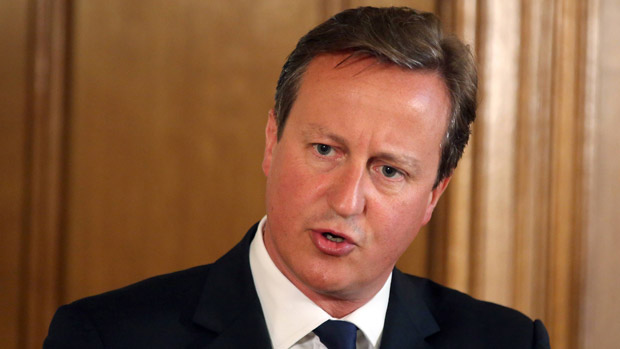Tories reveal plans to break ties with human rights court
Conservatives to scrap Human Rights Act and seize power from Europe if they win the next election

A free daily email with the biggest news stories of the day – and the best features from TheWeek.com
You are now subscribed
Your newsletter sign-up was successful
David Cameron is planning to cut ties with the European Court of Human Rights unless it allows British parliament to have the final say over its rulings.
The prime minister is due to announce plans to scrap the 1998 Human Rights Act and break the formal link between UK courts and the human rights court in Strasbourg if his party wins the next general election.
A new British Bill of Rights would prevent human rights laws being used by terrorists and criminals to stay in the UK, by travellers to occupy land illegally and by prisoners to demand the vote, say the Conservatives.
The Week
Escape your echo chamber. Get the facts behind the news, plus analysis from multiple perspectives.

Sign up for The Week's Free Newsletters
From our morning news briefing to a weekly Good News Newsletter, get the best of The Week delivered directly to your inbox.
From our morning news briefing to a weekly Good News Newsletter, get the best of The Week delivered directly to your inbox.
The European Convention on Human Rights was drafted by British lawyers after World War II, but Justice Secretary Chris Grayling describes the way in which the text has been interpreted in Strasbourg over the years as "mission creep".
He tells the Daily Telegraph: "We will put in place a provision that will say that the rulings of Strasbourg will not have legal effect in the UK without the consent of parliament. Effectively what we are doing is turning Strasbourg into an advisory body."
The Conservatives say they will publish a draft British Bill of Rights and Responsibilities before Christmas, with a strategy paper expected to be published today.
However, Isabella Sankey, director of policy at Liberty, describes the plans as "legally illiterate" and "clearly intended to diminish the rights of everyone in Britain".
A free daily email with the biggest news stories of the day – and the best features from TheWeek.com
She challenges Grayling's "mission creep" statement, noting that if the convention was applied according to the technology and social attitudes of the 1950s – when marital rape and corporal punishment were legal and homosexuality was prohibited – rights protection would "stagnate".
Tory MP and former attorney general Dominic Grieve has also dismissed his party's idea, describing it as "schoolboy stuff". He told the Financial Times: "This does not work and it is damaging to us to come up with half-baked solutions that don't bear close scrutiny."
-
 Political cartoons for February 7
Political cartoons for February 7Cartoons Saturday’s political cartoons include an earthquake warning, Washington Post Mortem, and more
-
 5 cinematic cartoons about Bezos betting big on 'Melania'
5 cinematic cartoons about Bezos betting big on 'Melania'Cartoons Artists take on a girlboss, a fetching newspaper, and more
-
 The fall of the generals: China’s military purge
The fall of the generals: China’s military purgeIn the Spotlight Xi Jinping’s extraordinary removal of senior general proves that no-one is safe from anti-corruption drive that has investigated millions
-
 The high street: Britain’s next political battleground?
The high street: Britain’s next political battleground?In the Spotlight Mass closure of shops and influx of organised crime are fuelling voter anger, and offer an opening for Reform UK
-
 Nicolás Maduro: from bus driver to Venezuela’s president
Nicolás Maduro: from bus driver to Venezuela’s presidentIn the Spotlight Shock capture by US special forces comes after Maduro’s 12-year rule proved that ‘underestimating him was a mistake’
-
 Is a Reform-Tory pact becoming more likely?
Is a Reform-Tory pact becoming more likely?Today’s Big Question Nigel Farage’s party is ahead in the polls but still falls well short of a Commons majority, while Conservatives are still losing MPs to Reform
-
 Taking the low road: why the SNP is still standing strong
Taking the low road: why the SNP is still standing strongTalking Point Party is on track for a fifth consecutive victory in May’s Holyrood election, despite controversies and plummeting support
-
 Why has the State Department scaled down its stance on human rights?
Why has the State Department scaled down its stance on human rights?Today's Big Question The Trump administration has curtailed previous criticisms of human rights violations
-
 What difference will the 'historic' UK-Germany treaty make?
What difference will the 'historic' UK-Germany treaty make?Today's Big Question Europe's two biggest economies sign first treaty since WWII, underscoring 'triangle alliance' with France amid growing Russian threat and US distance
-
 Is the G7 still relevant?
Is the G7 still relevant?Talking Point Donald Trump's early departure cast a shadow over this week's meeting of the world's major democracies
-
 Angela Rayner: Labour's next leader?
Angela Rayner: Labour's next leader?Today's Big Question A leaked memo has sparked speculation that the deputy PM is positioning herself as the left-of-centre alternative to Keir Starmer